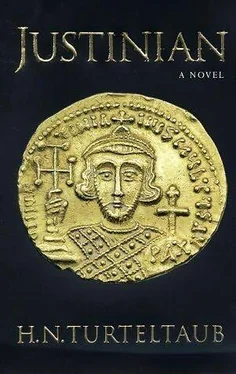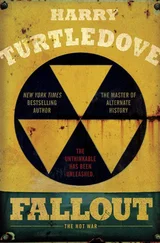Harry Turtledove - Justinian
Здесь есть возможность читать онлайн «Harry Turtledove - Justinian» весь текст электронной книги совершенно бесплатно (целиком полную версию без сокращений). В некоторых случаях можно слушать аудио, скачать через торрент в формате fb2 и присутствует краткое содержание. Жанр: Историческая проза, на английском языке. Описание произведения, (предисловие) а так же отзывы посетителей доступны на портале библиотеки ЛибКат.
- Название:Justinian
- Автор:
- Жанр:
- Год:неизвестен
- ISBN:нет данных
- Рейтинг книги:3 / 5. Голосов: 1
-
Избранное:Добавить в избранное
- Отзывы:
-
Ваша оценка:
- 60
- 1
- 2
- 3
- 4
- 5
Justinian: краткое содержание, описание и аннотация
Предлагаем к чтению аннотацию, описание, краткое содержание или предисловие (зависит от того, что написал сам автор книги «Justinian»). Если вы не нашли необходимую информацию о книге — напишите в комментариях, мы постараемся отыскать её.
Justinian — читать онлайн бесплатно полную книгу (весь текст) целиком
Ниже представлен текст книги, разбитый по страницам. Система сохранения места последней прочитанной страницы, позволяет с удобством читать онлайн бесплатно книгу «Justinian», без необходимости каждый раз заново искать на чём Вы остановились. Поставьте закладку, и сможете в любой момент перейти на страницу, на которой закончили чтение.
Интервал:
Закладка:
Sebasteia's garrison had been beefed up by summoning some of the soldiers off their fields in the Armeniac military district. Even so, the local commander, a certain Basil, was nervous. "They outnumber me, Emperor," he said. "They outnumber me by a lot. If they want this place, they can take it."
"Why on earth would they want it?" I said, very much as if I meant it. "The only reason they have come here is to meet me before they resettle them. We'll invite the chiefs into the city and feed them full of wine and mutton. We'll feed the warriors full of wine and mutton outside the walls, and give their brats candied figs. Everyone will stay happy, and then, a few at a time, everyone will start on the long road west. No one will even think of doing anything else."
He gave me an odd look, one I did not fully understand until later. I did not realize then how, while I took intrigue utterly for granted, having grown to manhood at its very heart, the court, others, especially others far from Constantinople, had to have things spelled out for them. Very well: the Mardaites could, if they so desired, take Sebasteia. We could do nothing about that, not in a military sense, for the time being. The key, then, was making sure they did not so desire- that, in fact, the idea of taking Sebasteia never so much as entered their minds.
How to do that? But putting extra men on the walls, by having the garrison prepare to sell its lives dear if attacked? What better way to show the Mardaites our secret fear, to plant the idea of attacking in their minds when it might not even have been there before? They were warriors; they could smell weakness.
We gave them nothing to smell. By proceeding as if everything was perfectly normal, we made certain everything stayed perfectly normal. I got drunk with their chiefs, and listened to stories of throat-cuttings and town-burnings all along the border, mostly told in a vile Greek I had trouble following. Even when I could not follow, I kept smiling, and promised them many throats to cut and many towns to burn in the places they were going. I promised no one would collect taxes from them for five years. I promised myself I would make sure the wine was better at the next such carouse, but the Mardaites did not need to know about that.
Band by band, a few hundred at a time, they set out west along the highway back to Constantinople. By the time four or five bands had departed, the ones who were left were a far smaller threat to the town or the garrison. Basil looked at me as he might have at a wizard. I looked at him with something like pity, doubting any chronicler would ever remember his name.
I soon headed west across the same highway myself. When in the course of my journey I came to Ankyra, about halfway between Sebasteia and the imperial city, I passed the night in the fortress there. Indeed, the capital of the military district of the Opsikion is little more than its fortress these days: the citadel, a strong rampart with pentagonal towers, sat on its hill overlooking a bathhouse, grand public buildings, several churches, and many, many houses- all dusty ruins, destroyed first in the Persian invasions and then in the onslaughts of the followers of the false prophet. As at so many stops on my journey, the contrast between what had been and what was now saddened me.
At the feast that night, a black-haired serving girl made certain my wine cup was never empty. When, wobbling as I walked, I went back to the chamber in which I was to sleep, I found her waiting under the covers for me. I started to order her out of the room, having had no congress with women since Eudokia died.
Before I could speak, though, she flipped back the blanket, the flickering lamplight showing she was naked. "Come," she said. "It is only a night." Her accent, absurdly, reminded me of Myakes'.
Had I had less to drink I think I should have sent her away, her abundantly displayed charms notwithstanding. But "wine is a mocker, strong drink is raging." My lust raged in me, and I had not the will to withstand it. Throwing off my robes, I got into the bed as naked as the girl and took her with the light still burning.
She was gone when I woke the next morning. My head pained me, as did my conscience, fornication being a sin in the eyes of God. But, oddly, along with the guilt I also knew a curious sense of release, as if I had taken a long step toward accepting that Eudokia's death was in the past, and irrevocable.
Those two feelings warred in me until I returned to the imperial palace. No sooner had I arrived than my mother thrust Epiphaneia in my face, exclaiming, "See how much she has grown while you were gone? See how she can smile now? Smile for your father, little pretty one."
Ephiphaneia smiled a toothless smile. I recoiled from it as from a demon; seeing the baby still reminded me unbearably of her mother's fate. My own mother began to cry. I pushed past her, and past my daughter, calling loudly for wine as I went. I stayed drunk for two days and bedded three maidservants. Yes, a sin- two sins- but sins that pushed aside pain.
MYAKES
He was a man, Brother Elpidios, and not a perfect one. You'll notice he admits he was a sinner. I've known a whole great swarm of men, out in the world and here in the monastery, too, who, if you listen to them talk, never did one wrong thing in all their born days. Well, maybe so, but maybe not, too. I haven't heard of a whole lot of people walking on water lately. Have you?
No, I wasn't along on this trip to Sebasteia. I'd come down with a flux of the bowels, and for a while there I wondered if I was going to go the same way Constantine had. I ended up getting better instead, but I was flat on my back for more than a month.
I'll tell you something, though. If I had been along, I'd have arranged to put a girl in Justinian's bed. That was the medicine he needed, sure as sure.
Yes, I'm a wretched reprobate. God will punish me. No doubt you're right about that, Brother. God has already punished me in this world, and He has all eternity to do as He likes with me in the world to come.
But I don't have all eternity here. I don't know how much time I do have, but I'd doubt it's a whole lot. I'd like to hear some more of the words Justinian left behind, if you don't mind too much.
JUSTINIAN
I had peace with the followers of the false prophet, and had it on better terms than my father had managed to wring from them. Not only that, but Abimelekh faced yet another uprising against his rule. My judgment was that my eastern frontier was as safe as it would ever be. I called up the cavalry from the military districts of Anatolia and ordered the horsemen to cross into Europe, as my father had in his ill-fated campaign against the Bulgars.
I intended to campaign against the Bulgars, too, and sent their emissaries away empty-handed when they came to collect the tribute to which my father had agreed. But the campaign I had in mind would not merely put the Bulgars in their place; it would also deal with the Sklavenoi, some of whom were under the control of the Bulgars and some of whom, in their revolting freedom, plundered Roman settlements all on their own. The suffering the land south of the Danube had endured made that of Anatolia seem as nothing beside it.
As had my father and grandfather and great-great-grandfather before me, I took the field in person. If the soldiers would not perform well under my eye, they would never perform well. And the Sklavenoi were so barbarous, I was certain they could produce no leaders with the wit to stand against us.
They were also divided among themselves, each little Sklavinia existing in a state of squalid independence, as often at war with its neighbors as with the Roman Empire. Like a foolish man in a fight who covers up where he has been hit rather than trying to anticipate where he will be hit next, they (or at least those not dominated by the Bulgars, who had better sense) were not likely to come to the aid of one another.
Читать дальшеИнтервал:
Закладка:
Похожие книги на «Justinian»
Представляем Вашему вниманию похожие книги на «Justinian» списком для выбора. Мы отобрали схожую по названию и смыслу литературу в надежде предоставить читателям больше вариантов отыскать новые, интересные, ещё непрочитанные произведения.
Обсуждение, отзывы о книге «Justinian» и просто собственные мнения читателей. Оставьте ваши комментарии, напишите, что Вы думаете о произведении, его смысле или главных героях. Укажите что конкретно понравилось, а что нет, и почему Вы так считаете.












